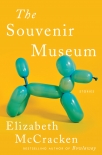The Souvenir Museum by Elizabeth McCracken (essential books to read .txt) 📗

- Author: Elizabeth McCracken
Book online «The Souvenir Museum by Elizabeth McCracken (essential books to read .txt) 📗». Author Elizabeth McCracken
The cave was a vast space with the sea sloshing in; the ledge itself was narrow for one-way traffic, never mind the necessary two: people sidled in and saw what they wanted then turned around and had to negotiate the oncomers, who froze against the walls with unease or skirted the edge and tried not to look down. Why would you do it? It was nearly slapstick, strangers fitting their bodies together (bottom to pelvis, bosom to Adam’s apple), reeling their arms in the air. Gravity is hilarious, until it kills you. Another thing his father had brought him to, full of excitement, that he had hated: silent movies at the revival house. Plimoth Plantation. The Museum of Natural History. The old battleship in the harbor. The graveyard to do rubbings. The trolley museum. His mother’s wake.
“This is intolerable,” David said aloud.
The Englishwoman reached behind with her free hand and took his.
Echoey commotion ahead. You couldn’t come out unchanged. They should turn back. It was him. He was the weak one. The Finns were deep in. The mother with her muddy shoes looked less brave here, perhaps why she hadn’t gone up the mountain on Lunga, and the daughter with Down syndrome was making little ah-ah-ah noises of care, and so she could listen to her voice echo. David thought he might faint. He tried to get his hand loose. If he did faint, if he did tip over, he would pull the Englishwoman down, and then his father, who might have joined up to who-knows-who in front. A daisy chain of tourists down, not just one careless German. Lunch for Fingal.
The story of this trip was supposed to be the past: Arlene was dead. He had thought the future was a ways away. She would have hated to outlive me, Louis had told David. The sad thing was she’d been looking forward to it. She loved him, she’d miss him: at least the house would be quiet.
All of a sudden, without planning to, David was sitting down.
“Op!” said somebody behind him.
He crossed his legs and leaned against the wall. Below him the water sloshed. Where did the tide go, when it went out? He always imagined it balling up in the middle of the ocean, but what if it were a blanket tugged between sleepers, first one side of the bed, then the other?
“Vertigo,” he heard a woman pronounce in an English accent.
On either side of him people were trying to coax him to his feet. It was too narrow a foothold for kindness. Somebody tried to go behind him; another stepped over his legs.
“Get up,” the Englishwoman said.
No. He would have to be pulled from the cave like a tooth. The only solution for fear was stubbornness. His mother had taught him that. She had raised him to believe in the power of obstinacy, and now, on an uninhabited island in a cathedral built by nobody, he clung to his faith. He was the only child of an old man. That had meant one thing when he was a boy, and meant new things now.
Then his father was there, leaning over, hands on thighs.
“Well,” said Louis. “What have we here?”
“I should get up,” admitted David.
Louis looked around them. On one side, a girl wearing binoculars regarded them. A bird-watcher, perhaps—those were good bird-watching glasses—and then Louis recognized her as one of Sidney’s countrywomen, her face round and flat and, at the moment, impressed at this peculiar behavior. He sat down.
“This is not progress!” yelled one of the Swedes.
“Come on, friend,” said Louis. “Let’s stand up.”
“I’m not your friend,” said David.
Louis nodded. No, his beautiful, pessimistic son—pessimism is a form of cowardice, but Louis knew better than to say so to his beloved pessimists. “Nevertheless.”
“I don’t know how.”
“The usual way, I think,” said Louis. Then, helped by a dozen hands, as in a child’s séance, they were lifted up, and the cave was filled with applause, genuine, sarcastic, dutiful.
Nobody mentioned anything on the boat home. “Subdued!” said Robby, appraising them as they boarded, one by one, then, to David, “You caught the Scottish sun. Rare but deadly. Should have worn a hat.”
Back in Tobermory they passed a poster for the Highland Games, held that day at the golf course. Already the cabers were being packed up. That’s what we should have done, David thought. By next month his father might not even remember the puffins. But around the world a story would be told, in Helsinki, in Devon, in Malmö: A man panicked. We saved him. Without us he would have died.
He would have to rearrange both their lives before the worst happened. But not yet. Together they would fly back to Boston. David would go on to Seattle; from a distance he could pretend his father was fine. It’s not an emergency, he told himself, though he knew otherwise, an emergency the way all of life was.
In front of the bank a teenage boy played violin for money; when David concentrated he recognized it as “Good Vibrations,” heart-lifting and strange. He put his hands in his pockets and found one fifty-pence piece, polygonal like the rocks of Staffa. He tossed it into the open violin case.
“Got any pound coins?” David asked, and his father dug in his pockets, produced two handfuls of broken things.
That morning they’d been to the little history museum. Had his father stolen something? Blue, brown, violet: the pottery looked old, older than his father, than Levine’s of Montville. Exhibition old. It was beautiful, timeworn, a





Comments (0)